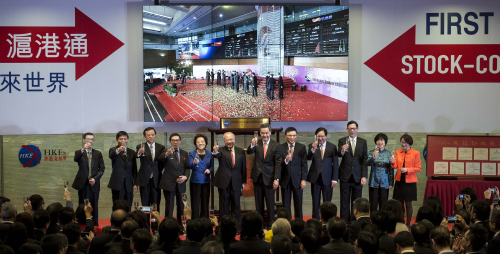 |
|
OPEN CHANNEL: Leung Chun-ying (sixth right), Chief Executive of Hong Kong Special Administrative Region, and Chow Chung-kong (sixth left), Chairman of Hong Kong Exchanges and Clearing Ltd., raise a toast to the launch of the Stock Connect program at the Hong Kong Stock Exchange on November 17 (LU XIAOWEI) |
After waiting for more than half a year, the Shanghai-Hong Kong Stock Connect program, which allows mainland and Hong Kong investors to trade shares on each other's bourses, was eventually launched on November 17, boding well for the reform on China's capital market.
Since Chinese Premier Li Keqiang suggested China would create conditions for the interconnection between Shanghai and Hong Kong stock exchanges at the annual conference of the Boao Forum for Asia in April, investors of the two sides have been prepared to have fingers in the pot.
With the two-way channel, mainland institutional and individual investors can trade 268 H-shares in Hong Kong Stock Exchange, and Hong Kong investors can trade 568 A-shares in Shanghai Stock Exchange. At the preliminary stage, northbound trading—investors with Hong Kong stock accounts buying A-shares—are capped by a daily quota of 13 billion yuan ($2.1 billion) and a total quota of 300 billion yuan ($49 billion), while southbound trading—mainland stock investors buying HK shares—are capped by a daily quota of 10.5 billion yuan ($1.7 billion) and a total quota of 250 billion yuan ($41 billion).
When the exchange link began on November 17, the volume of northbound trading was far greater than trading from mainland investors in the opposite direction. While the 13-billion-yuan ($2.1-billion) daily northbound quota had been used up by mid-afternoon, less than 17 percent of the 10.5-billion-yuan ($1.7 billion) southbound quota had been taken up that day.
"It took a longer-than-expected period of time for such a small daily quota to be used, indicating overall sentiment in Shanghai remains cautious," said Zhang Gang, a senior analyst at Central Securities Corp. in Shanghai.
As Dong Hao, an analyst at China Fortune Securities Co. Ltd., argued investors on the Hong Kong Stock Exchange tended to snap up Chinese stocks because they know well that China's A-shares have been undervalued these years. On the other hand, since mainland investors have not yet become accustomed to the transaction rules and the information disclosure of H-shares, a large number of southbound transactions were rendered invalid.
Although the current situation will last for some time, the Stock Connect program marks important progress made in the opening up of the domestic capital market, Dong noted, predicting that the quota of both northbound and southbound investments will be constantly expanded in days to come.
Surge of success
At the opening ceremony of the Stock Connect program, Xiao Gang, Chairman of China Securities Regulatory Commission, appraised it as a significant institutional innovation for the two-way opening up of the capital market.
The move has enriched trade categories, optimized the market structure and provided more openings for both internal and external investors, said Xiao, who also referred to its significant role in pushing forward the yuan's internationalization and improving the convertibility of cross-border capital and financial transactions.
With the Stock Connect program, transactions of H-shares made by mainland investors are quoted in Hong Kong dollars and settled in renminbi. The transactions of A-shares made by Hong Kong investors are also quoted and settled in renminbi.
Xiao's statement is echoed by Leung Chun-ying, Chief Executive of Hong Kong Special Administrative Region, who also believes the Stock Connect will give a leg up for the renminbi to become an investment currency in the international market.
According to Lin Caiyi, chief economist at Guotai Junan Securities Co. Ltd., the internationalization of the yuan should go through three steps: First, it will be used in the settlement of cross-border trade; second, people and countries will hold it because it's strong, and in this way, it will be able to flow to the offshore market; third, its value will stabilize or increase, and it can flow back to China and make investors benefit from the economic growth of the issuing country.
"The Stock Connect provides a channel for the yuan to flow back to China and then help it realize the general circulation," said Lin.
Tse Yung-hoi, Honorary Chairman of the Chinese Securities Association of Hong Kong, held that the interconnection of Shanghai and Hong Kong stock exchanges will expand the capital pool and the investment channel of offshore yuan. The interconnection will also facilitate its flow in both directions, thereby quickening the pace of the yuan's internationalization.
Aside from integrating the mainland stock market with the international financial markets, the Stock Connect will also strengthen the status of Hong Kong and Shanghai as two international financial centers and promote Hong Kong as the offshore yuan center, said Leung.
On November 17, the Hong Kong Monetary Authority also called off the 20,000-yuan ($3,268) ceiling for Hong Kong residents to buy renminbi in an effort to allow Hong Kong investors to purchase or sell renminbi in a more convenient way, coincident with the drive of the Stock Connect.
| 